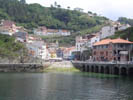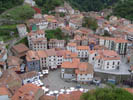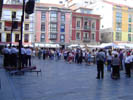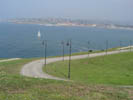La Pensée Complexe comme Méthode d'Apprentissage dans l'Erreur et l'Incertitude Humaines
Posted: July 20th, 2003 | No Comments »J’ai enfin terminé mes notes sur le livre d’Edgar Morin, Raúl Motta et Emilio-Roger Ciurana “Eduquer pour l’ére planétaire”.
Interface Culture – The Desktop
Posted: July 18th, 2003 | No Comments »A few quote from the chapter “The Desktop” in Steven Johnson’s Interface Culture:
“The modern shopping mall – with its teeming equivalent of displays and byzantine floor plan – is the spacial equivalent of today’s MTV-style advertising. In these high-velocity times, anything that disorients sells product”.
“The way we choos to organize our space says an enormous amount about the society we live in – perhaps more than any other components of our cultural habits“.
Read the rest of this entry »
Outdoor Distributed Computing
Posted: July 18th, 2003 | No Comments »By reading a post by icon on seminare on Outdoor distributed computing, a few questions came to my mind:
Isn’t the term “outdoor” abusly used to mean “mobile”? (outdoor is a sub-caterogy of mobile?) If no, what is the difference between outdoor and mobile?
What is meant by “conventional distributed computing does not work”? What drawbacks of conventional distributed computing have been mentionned? What are the potential solutions?
For all the points mentionned, decentralized(peer-to-peer) distributed computing immadiatly poped to my mind. (p2p=dynamic configuation, tolerates unpredictable delays, configuration changes during execution (example of decentralized mobile agents framework “Negotiator” where state of the nodes changes ![]() ) Did the seminar went that direction too (or was it non-technical and more abstract)?
) Did the seminar went that direction too (or was it non-technical and more abstract)?
Lo importante hoy es la cultura del acceso libre, lo ciberpunk ha envejecido
Posted: July 17th, 2003 | No Comments »Resumen de un articlo sobre Bruce Sterling publicado en el periodico espanol El Pais. Bruce Sterling esta una de las principales figuras del ciberpunk (junto a William Gibson). La palabra cíber se refiere a la civernética y el control del hombre sobre la máquina, tal y como la definió Norbert Wiener en 1948. El segundo concepto, punk, se emplea de forma generalizada desde 1976, aplicado a un estilo musical autodidacta, caracterizado pro actitudes independientes y anárquicas. El ficción de Sterling hace referencia al futuro cercano y “al impacto que origina la tecnología en la sociedad”. Por Sterling, el término ciberpunk suena un tanto desfasado hoy en día. “Nada es una novedad siempre. Así que cualquier cosa que sea cíber, incluso el término cíber, he quedada anticuada. Es como decir electro, atómica or aerodinámico”.
En la actualidad, Bruce Sterling prefiere escribir artículos titulados La información quiere ser gratuita. “Esta idea es casi tan poderosa como la anterior”. Al contrario de piratos de software (ellos se comportan como si pertenecieran a una cultura abierta, pero lo único que hacen es vulnerar la propiedad ajena), gente con una cultura de libre acceso (Open Source Culture) tiene un plan. Van de la A a la B a la C y consiguen grandes cosas. La gente de Open Source es mucho más agresiva. Tienen soluciones práticas para un montón de problemas acuciantes y eso es algo viable y poco frecuente.
El interés de Sterling por la contracultura ha terminado. “Eso es para amas de casa aburridas”. Está interesado en escribir un novela que sólo pueda haberse escrito en el siglo XXI. Parte del material probablemente pueda encontrarse en su último libro, “Tomorrow Now: Envisioning the Next Fifty Year”.
Interface Culture – Bittmapping
Posted: July 17th, 2003 | No Comments »I started reading Interface Culture (How new technology transforms the way we create and communicate) by Steven Johnson. The central topic of this book is about the fusion of art and technology that Johnson calls interface design. In his introduction, he flaters every engineer’s ego by coupling them with artists:
Was the original cave painter an artist or an engineer? She was both, of course, like most artists and engineers since. But we have a habit – long cultivated – of imagining them as seperate, the two great tributaries rolling steadily to the sea of modernity, and dividing everyone in their path into two camps: those that dwell on the shores of technology and those that dwell on the shores of culture. The opposition colors much of modern thought. (Even the human grain is now seen as having a lobe for artists and a lob for engineers.). But it is false as the genetic separation between human and ape.
I have been thinking the same since I got my degree ![]()
My favourite quote so fare: “In the cultural sphere, the hybrids are stronger, more innovative, more robust than the pure breeds“.
Read the rest of this entry »
Quiero Aguardiente de Hierbas!
Posted: July 17th, 2003 | No Comments »Aguardiente con un nombre muy explicito… ![]()
Importance of Video Games in Learning and Literacy
Posted: July 10th, 2003 | 1 Comment »I do not consider myself as a gamer anymore, but I happen to think that games of my teenage years like La Hanse, Player Manager (kick-off extension), or even Bubble Bubble (played in pairs) or later Civilization or Sim City were great educators. James Paul Gee goes deeper and shows the world the importance of games video games. A few quotes:
Arquitectura en Oviedo
Posted: July 7th, 2003 | No Comments »

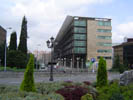



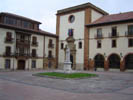
Calle Independencia, Avenida de Santander, Catedral, Centro civico, Plaza del Fontán (2x), La Losa, Facultad de Psicología

